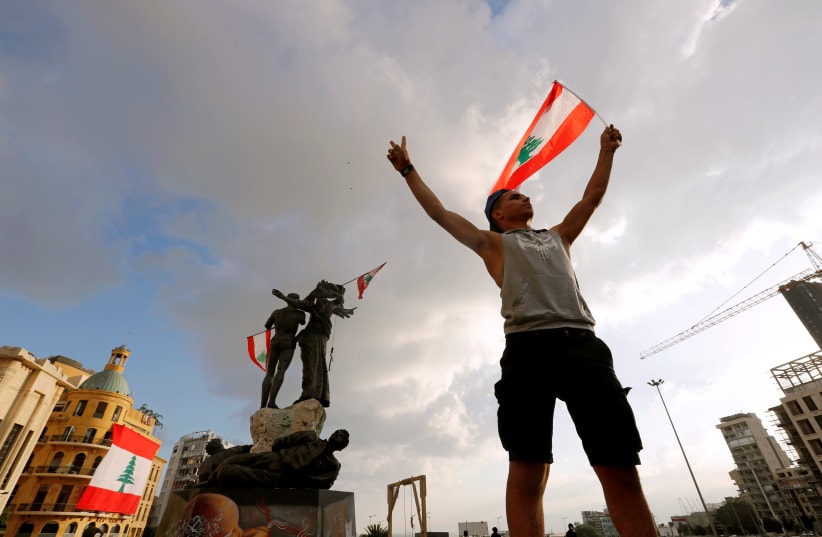Individuals in Latin America and the United States are organizing relief efforts in response to the massive explosion that shook Beirut on August 4.
The blast at the city’s port left at least 171 people dead, thousands injured and more than 300,000 temporarily homeless.
Valerie Frangie, a native of Caracas, Venezuela, is spearheading a digital cookbook fundraiser, with proceeds being donated to the Lebanese Red Cross. La Cocina de Mamarie: Autentica Comida Libanesa compiles her Lebanese grandmother’s recipes.
Frangie believes the local Red Cross is a trustworthy organization with a proven track record and has been in contact with it to facilitate the transfer of funds.
“They work very hard and they’re very transparent,” she told The Media Line.
The Red Cross is helping victims of the explosion by providing medical assistance, mental health support, shelter and essential relief supplies. It shared with The Media Line its plans to provide shelter and aid as many as 10,000 families in the coming weeks and months.
Frangie is a member of one of the largest Lebanese diasporas in Latin America. She maintains close ties to the country; it is like a second home. Her family is originally from the northern city of Zgharta, where her father currently resides.
She believes Beirut’s rebuilding will come about through the hard work of the Lebanese people.
“I do trust the rebuilding process a lot because I trust the Lebanese people,” she said. “We are so strong, and the solidarity between us is very important.”
Days after the explosion, Prime Minister Hassan Diab and his entire cabinet resigned amid corruption allegations and a wave of public demonstrations. Frangie admits to distrust of the Lebanese state apparatus but says this does not slow down her optimism.
“I think we’re going to be back up in less [time] than we think, but it is because of the people, not because of the government,” she noted.
FabricAID, a local organization in Beirut that seeks to reduce fabric waste through clothing donations, is helping to rebuild neighborhoods affected by the blast. It is led by Omar Itani, who in 2019 was recognized by the United Nations with its Young Champion of the Earth Prize.
Samah Tokmachi, a filmmaker in Los Angeles, organized a GoFundMe page calling for donations to help FabricAID. The funds will be dispersed by Itani, whom he met while on a professional trip to Lebanon.
“I see their work ethic and their dynamism. They know the population. They know the problems. They know the history. And they have the distribution channels,” he told The Media Line.
“It’s not a false dichotomy of [a] local versus international effort, but it’s the people who are on the ground, who have the experience that know how to directly address the problems there,” he explained.
Itani wrote a message on the GoFundMe page.
“FabricAID will support the efforts of dedicated volunteers and professionals in construction and renovation…. We are going to help locals we know… to be unable to renovate their own shops and houses [to repair] the damage,” he said.
Most of the donors are people of different backgrounds who, like Tokmachi himself, have no family ties to Lebanon. He believes this solidarity originates from a sense of collective responsibility.
One of the contributors, Tom Nassr, is a third-generation Lebanese-American. He is also friends with Itani. The pair met in Beirut at a social entrepreneurial summit in 2017 – Nassr’s first visit to the country.
An entrepreneur and app developer, Nassr knows about relief operations through his experience with Kricket, a geography-based social networking app he developed with his company, Checkmate Digital.
“Organizations like the Red Cross are reliant on donors. They have certain liberties. They can take the money and share it with the people that need it the most,” he told The Media Line. “But people like Omar, social entrepreneurs, are more focused on creating a sustainable vehicle to create value repetitively, regardless of the donor base.”
Nassr strongly believes his contribution to FabricAID will have a larger impact in the rebuilding of Beirut.
“I think the bigger organizations have a tough time drawing the line to where my dollar goes,” he explained. “That’s why I’m donating to Omar as opposed to the Red Cross or any other organization. I think he is going to stretch every dollar… much, much farther.”
